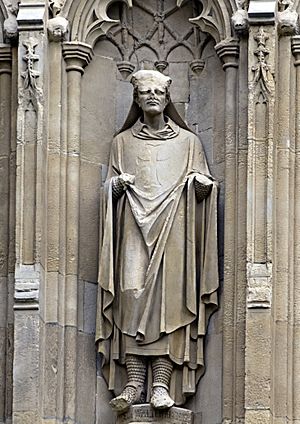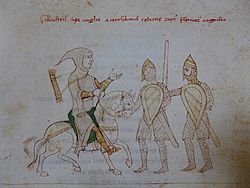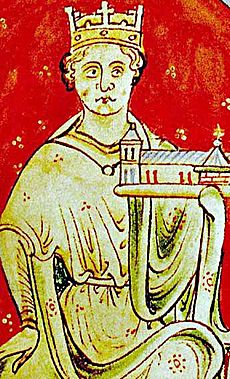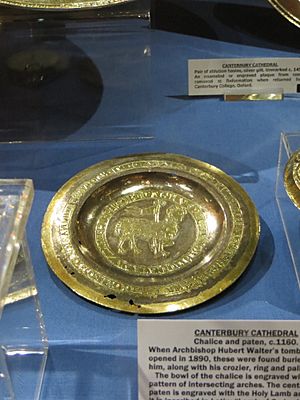Hubert Walter facts for kids
Quick facts for kids Hubert Walter |
|
|---|---|
| Archbishop of Canterbury | |

Statue of Hubert Walter from the exterior of Canterbury Cathedral
|
|
| Elected | 29 May 1193 |
| Enthroned | 7 November 1193 |
| Reign ended | 13 July 1205 |
| Predecessor | Reginald fitzJocelin (elected but died before consecration) |
| Successor | Reginald |
| Other posts | Bishop of Salisbury |
| Orders | |
| Consecration | 22 October 1189 |
| Personal details | |
| Born | c. 1160 |
| Died | 13 July 1205 |
| Buried | Trinity Chapel in Canterbury Cathedral |
| Parents | Hervey Walter Maud de Valoignes |
Hubert Walter (around 1160 – 13 July 1205) was a very important person in England during the late 1100s and early 1200s. He was a trusted advisor to kings and held powerful jobs. These included being the Chief Justiciar of England (like a chief judge or prime minister), the Archbishop of Canterbury (the most important church leader in England), and the Lord Chancellor (a top government official).
As Lord Chancellor, Hubert Walter started keeping official records of all important documents issued by the government. This was a big step in how government records were kept. People at the time didn't think he was especially religious or super smart from books. However, historians today see him as one of the best government leaders in English history.
Hubert Walter got his start thanks to his uncle, Ranulf de Glanvill. His uncle helped him get a job at the Exchequer, which was like the government's finance department. Walter worked for King Henry II of England in many ways. He handled money, helped with diplomacy, and worked as a judge. After trying to become the Archbishop of York, Walter was chosen to be the Bishop of Salisbury. This happened soon after Henry's son, Richard I, became king.
Walter went with King Richard on the Third Crusade. He was also key in raising money to free Richard after the king was captured in Germany. As a reward for his loyal service, Walter was chosen to be the Archbishop of Canterbury in 1193. He also served as Richard's Justiciar until 1198. In this role, he was in charge of getting the money Richard needed for his wars in France. Walter created a system that was an early version of today's justices of the peace. This system involved choosing four knights in each area (called a hundred) to handle justice.
After King Richard died in 1199, Walter helped make sure Richard's brother John became the new king. Walter also worked for King John as a diplomat, going on several missions to France.
Contents
Hubert Walter's Early Life and Family
Hubert Walter was the son of Hervey Walter and Maud de Valoignes. Maud was one of the daughters of Theobald de Valoignes, who was a lord in Suffolk. Hubert was one of six brothers. His older brother, Theobald Walter, and Hubert himself, got help in their careers from their uncle, Ranulf de Glanvill. Glanvill was the chief Justiciar for King Henry II. He was married to Maud de Valoignes' sister, Bertha.
Hubert's family came from West Dereham in Norfolk, which is probably where he was born. He first appears working for Glanvill around 1178. His brother Theobald also worked for their uncle. Hubert Walter showed his thanks to his aunt and uncle when he started a monastery in Dereham. He asked the monastery to pray for "Ranulf Glanvill and Bertha his wife, who nourished us."
Some older historians thought Walter studied law in Bologna, Italy. However, modern historians don't think this is true. Other evidence suggests Walter wasn't very good at Latin and didn't see himself as a "book-learned" person. This doesn't mean he couldn't read or write, but that he didn't go to a university. A writer from his time, Gerald of Wales, said that the Exchequer (the finance department) was Walter's school.
Working for the King
By 1184–1185, Hubert Walter was working as a baron of the exchequer. This meant he was an important official in the king's financial department. King Henry II used him for many tasks. These included being a negotiator, a judge, and a royal secretary.
Around July 1186, he was made Dean of York. The position of Archbishop of York was empty at the time, so it was Walter's job to manage the church in York. Walter also tried to become the Archbishop of York in September 1186 but wasn't chosen. A writer from the Middle Ages, Gervase of Canterbury, said that during Henry II's reign, Walter "ruled England because Glanvill sought his counsel." This shows how important Walter was.
In 1188, Walter started a monastery for Premonstratensian canons in West Dereham, Norfolk. His uncle and other family members liked this religious group. This monastery was close to his family's lands.
In 1187, Walter, along with Glanvill and King Henry II, tried to settle a disagreement. This was between the Archbishop of Canterbury, Baldwin of Forde, and the monks of the cathedral chapter. Their efforts didn't work. Walter later got involved in this dispute again in 1189 and even as archbishop. The fight was about Baldwin wanting to build a new church near Canterbury. The monks worried this new church would take away their power to choose the archbishop. The problem was partly solved when Baldwin agreed to build the church further away.
Becoming a Bishop and Archbishop
After King Henry died in 1189, the new King Richard I made Walter the Bishop of Salisbury. He was chosen on 15 September 1189 and officially became bishop on 22 October 1189. Many new bishops were chosen at this time. This probably showed that the new king wanted to do things differently from his father. King Henry II often left bishop positions empty to keep the money from those church lands.
Soon after becoming bishop, Walter went with King Richard on the Third Crusade. He traveled directly to the Holy Land. While on the crusade, other crusaders praised him. He was Richard's main negotiator with Saladin for a peace treaty. After the treaty, Walter was among the first group of pilgrims to enter Jerusalem. Saladin even hosted Walter during his visit. Walter managed to get Saladin to promise that a small group of Western clergy could stay in Jerusalem to hold church services.
Walter then led the English army back to England after Richard left. But in Sicily, he heard that the king had been captured. So, he went to Germany instead. He was one of the first of Richard's people to find the king. In April 1193, he returned to England to help raise money for the king's ransom. Richard wrote to his mother, Queen Eleanor of Aquitaine, saying Walter should be the next Archbishop of Canterbury. Soon after Walter returned, he was chosen as archbishop on 29 May 1193. He received his pallium, a symbol of his authority, from Pope Celestine III. He was officially made archbishop at Canterbury on 7 November 1193.
Running England as Justiciar
After Richard was freed, he didn't spend much time in England. He focused on fighting King Philip II of France. Richard made Walter the Chief Justiciar around 25 December 1193. Walter stayed in England, raising money for the king's wars and managing the country. The constant wars meant Walter had to find new ways to collect taxes. One historian, Doris Stenton, wrote that the financial records from Walter's time show "a country taxed to the limit."
Walter was also in charge of choosing royal judges. Many of his choices were people who had worked with him before in the government. Because Richard was away from England, Walter had more power as Justiciar than anyone before him. All Walter had to do was make sure Richard had enough money. With his role as archbishop, Walter had a lot of power in England.
One of Walter's first actions as Justiciar was in February 1194. He oversaw a legal judgment against John, Richard's younger brother. After Richard was captured, John tried to start a rebellion. His castles were prepared for defense. John's letters were caught, and he lost his lands. When John didn't give up, Walter called a church meeting. He said John would be excommunicated (kicked out of the church) if he didn't surrender. John refused and was excommunicated. Walter even had to lead a siege against Marlborough Castle himself to stop the rebellion. Eventually, in May 1194, John made peace with Richard.
Walter's main government changes included his instructions to traveling judges in 1194 and 1198. He also made an order in 1195 to improve order in the kingdom. In 1198, he planned a new land tax. In 1194, judges were told to make sure each county elected four coroners. Coroners were to keep records of royal legal cases, a job previously done by the sheriff. Juries were chosen by four knights, also elected by the county. This change reduced the importance of sheriffs in royal government.
Walter also worked to control money lending by Jewish moneylenders. He set up a system where royal officials helped prevent fraud from both sides. Walter likely started the practice of keeping copies of all important documents like charters and legal agreements in the chancery.
He also helped create a more professional group of royal judges. While many had been judges before, Walter used them a lot. He seemed to choose them for their skills, not just family ties. This group of men replaced the old system of using mostly local people. This was an early sign of a professional justice system.
In 1195, Walter ordered that four knights be appointed in every hundred to act as guardians of the peace. This was an early version of the Justice of the Peace role. These knights were the first sign of this group becoming important in English government. In 1198, Walter asked for a carucage, a tax on land based on how much land could be plowed. When there were problems with how to measure the land, Walter ordered that sworn juries in each hundred should do the assessments. These jurors were probably elected.
In foreign matters, Walter talked with Scotland in 1195 and with the Welsh in 1197. Scotland claimed northern England. The talks didn't lead to an agreement, but relations stayed good. Talks with the Welsh started after English lords expanded into Welsh territory. In 1196, Walter quickly stopped a rebellion in London led by William Fitz Osbern. FitzOsbern was a speaker who used the anger of London's poor people about high taxes. His speeches caused a riot, and he was caught and hanged on Walter's orders.
Church Matters and Resignation
Walter was given special authority by Pope Celestine III from 1195 to 1198. This allowed him to act with the pope's power within the English Church. Walter actively looked into bad behavior by church officials. He removed several abbots from their positions. In his own area, he gave towns the right to hold markets and fairs. He also worked to get back lands that had been lost to the archdiocese.
Walter brought back an old plan from his predecessor, Baldwin of Forde. This plan was to start a new church in Canterbury that would be run by secular clergy (priests not living in monasteries) instead of monks. He promised that the new church's canons wouldn't vote in archbishop elections. He also promised that the body of Saint Thomas Becket would never be moved there. But the monks of his cathedral were suspicious and complained to the pope. The dispute flared up again, with the pope supporting the monks and the king supporting the archbishop. Finally, Pope Innocent III sided with the monks and told Walter to destroy what had been built.
The archbishop held church councils. One was in York in 1195, which said that clergy should collect their tithes (church taxes) in full. Another council was in London in 1200. This council made rules about the size of church officials' groups and said that clergy should speak clearly when saying Mass. At the pope's request, Walter also led investigations into making Gilbert of Sempringham and Wulfstan of Worcester saints.
In the later part of Richard's reign, Walter faced more pressure. Conflicts between his church duties and government duties led to criticism from both sides. A disagreement in December 1197, about Richard's demand for 300 knights for his wars in France, caused more complaints among the clergy and nobles. Richard was also unhappy with the results of the land tax in 1198. So, Walter resigned as chief Justiciar on 11 July of that year. Walter might have wanted to resign, as he had talked about leaving his government jobs since 1194. However, some old writings say the king forced him out of office.
Serving King John
According to a book written soon after 1219, when William Marshal heard King Richard had died, he talked with Walter about who should be the next king. Marshal wanted John, but Walter first thought of John's young nephew, Arthur of Brittany. When Marshal insisted on John, who was an adult, the book says Walter replied, " 'So be it then,' said the archbishop, 'but mark my words, Marshal, you will never regret anything in your life as much as this.'" This quote was likely added later, based on John's future actions.
Once John knew he had the support of Walter and William Marshal, he sent Walter to England. Walter was to ask all free men to promise loyalty to the new king. On 27 May 1199, Walter crowned John. On his coronation day, John made Walter Lord Chancellor. A historian named W. L. Warren said of Walter that "No one living had a firmer grasp of the intricacies of royal government, yet even in old age his mind was adaptable and fecund with suggestions for coping with new problems."
One of Walter's first ideas was to lower the fees for getting official documents confirmed. This also meant that no document would be accepted in a king's court unless King John had confirmed it. This helped stop fake documents. It also led to the creation of the Charter Roll, an official copy of all documents issued and confirmed by the government. Walter also worked closely with the Justiciar, Geoffrey Fitz Peter, on collecting taxes. Both men went to Wales in 1203 on a diplomatic mission.
Walter was also responsible for keeping copies of other royal letters. These were recorded in the Close Rolls and Patent Rolls. The Patent Rolls recorded letters that were sent openly, and the Close Rolls recorded letters that were sealed. These records exist from 1199 for the Charter Roll, 1201 for the Patent Roll, and 1204 for the Close Roll. Walter also continued to make changes in local government. The earliest records of coroners' rolls, or county records, being used to check spoken evidence in county courts are from 1202 and 1203, during Walter's time as chancellor.
In 1201, Walter went on a diplomatic mission to Philip II of France, but it was not successful. In 1202, he returned to England as regent (someone who rules when the king is away) while John was abroad. In April 1204, Walter went back to France with other important people to try to make peace with Philip Augustus. Philip wanted John to give up Arthur of Brittany, Arthur's sister Eleanor, and all his lands in France. John refused, and the group returned to England shortly before Philip conquered Normandy.
Besides sending Walter on diplomatic missions, King John gave Walter control of Rochester Castle in 1202. John also supported the archbishop's right to make coins, which Walter did until his death in 1205.
Under John, Walter continued to be active in church matters. In September 1200, he held a church council in London. This council made 14 rules about various topics, including church beliefs, money, and the duties of the clergy. Walter also helped settle a dispute between the pope and the king over the Cistercian monks in 1200. Walter's help stopped the dispute from getting worse. It was in 1200 that the church court records of Canterbury began to be kept.
Hubert Walter's Death and Legacy
Hubert Walter died on 13 July 1205, after a long illness. A writer from the Middle Ages, Ralph of Coggeshall, said his death took four days. He also said Walter gave church clothes, jewelry, and altar items to his monks, but King John took them after Walter died. He was buried in the Trinity Chapel in Canterbury Cathedral, next to Thomas Becket. His tomb can still be seen there. His tomb was in a very important spot. He was the first archbishop buried there since the 1170s. The title "Primate of All England" for the Archbishops of Canterbury started during Walter's time.
The medieval writer Matthew Paris told a story that when King John heard Walter had died, the king supposedly said, "Now for the first time I am king of England." This story is probably not true. However, another writer, Roger of Wendover, said that Walter's Christmas celebrations in 1200 angered King John. Roger reported that Walter gave clothes to those at his Christmas feast. The writer said Walter "wished to put himself on a par with the king."
Hubert Walter was not known for being a very holy man. However, as historian John Gillingham says, he was "one of the most outstanding government ministers in English History." Modern historians don't believe that Walter was the only one behind the government changes during Richard's reign. Studies show that Richard was very involved in government decisions. It was more of a partnership between the king and his ministers. However, Walter was very creative in how he approached government. Walter continued to have the support of Richard's brother John. Many of Walter's government changes happened during John's reign.
Walter was sometimes made fun of for not being very educated. He was the subject of stories by the writer Gerald of Wales. Even Walter's supporters could only say he was "moderately literate." Walter hired several church lawyers who had studied in Bologna, Italy. He also hired the architect Elias of Dereham, who was one of Walter's executors. Elias is often given credit for being the architect of Salisbury Cathedral after Walter's death. Another scholar Walter hired was Peter of Blois, who served as a Latin secretary.
We don't know much about how he looked, but Gerald of Wales described him as tall and handsome. Gerald also praised his intelligence and cleverness.
Some historians have suggested that Walter, or Geoffrey Fitz Peter, might have written the Tractatus de legibus et consuetudinibus regni Angliae. This was an important legal book about English laws and customs. If he wrote it, it would be a great record of Henry II's government. However, Walter's biographers today don't think he wrote it. Historian Michael Clanchy said of Walter, "The increase in official documents was happening across Europe, but if it were to be linked to one man in England, it would be Hubert Walter."
|
See also
 In Spanish: Hubert Walter para niños
In Spanish: Hubert Walter para niños
 | Roy Wilkins |
 | John Lewis |
 | Linda Carol Brown |




